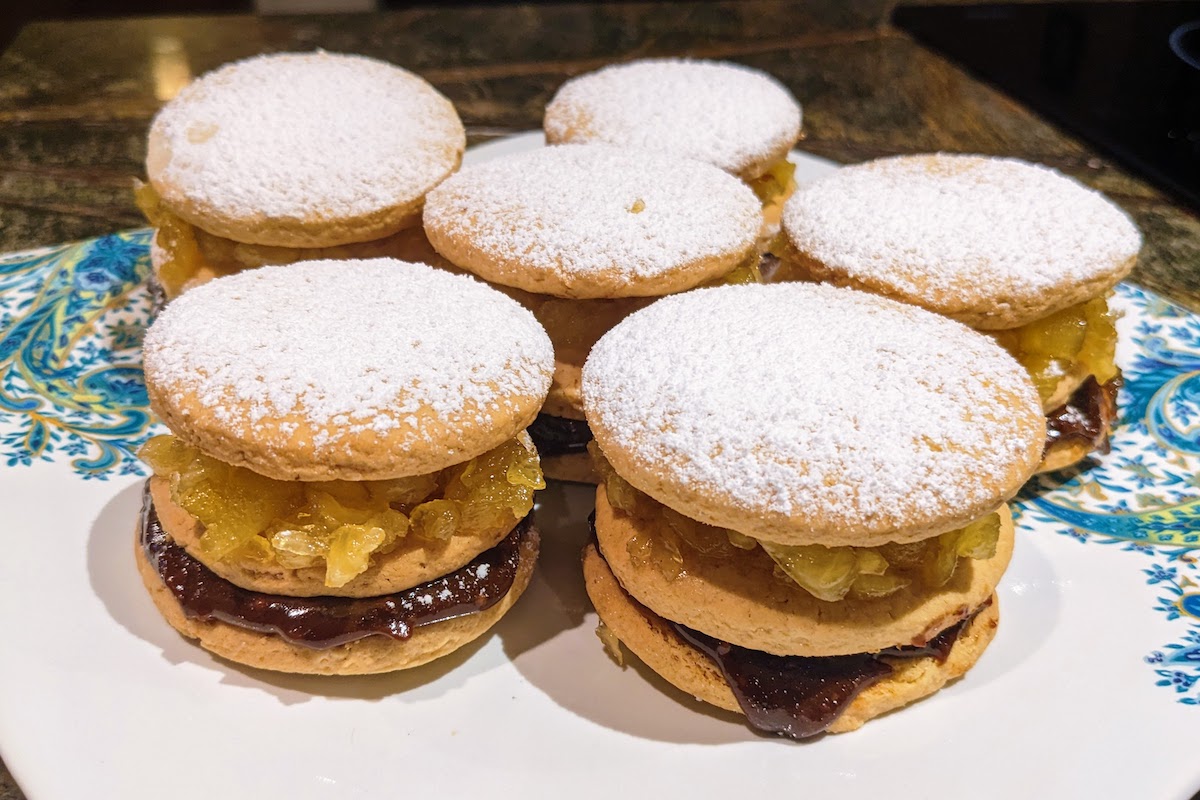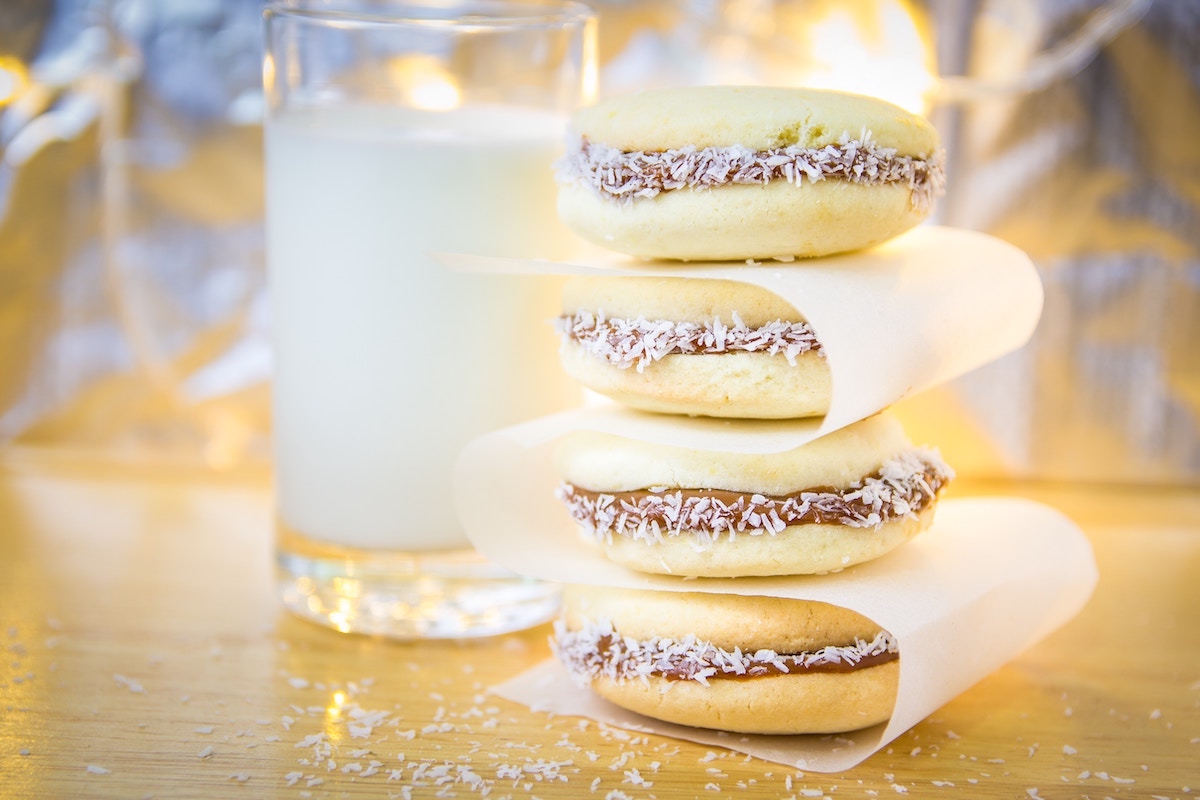
The Story of the King Kong Dessert: Northern Peru’s Signature Sweet (Plus a Recipe!)
By: Sarah Stone
Skip to Section
Have you heard of Peru’s delicious, delectable King Kong dessert?
This beloved sweet treat originates from the northern region of Peru—it’s particularly associated with the city of Lambayeque, near Chiclayo. It’s been part of the regional gastronomy for over a century, and, due to its enormous size, is named aptly for the giant movie ape!
Here’s a breakdown of what the King Kong dessert is and what makes it so special—plus a recipe for you to try making a King Kong on your own.
Why the Name?
About 100 years ago, baker Victoria Meija set out to create a spin on the classic alfajores cookies, which consisted of two flaky biscuits with manjar blanco (like dulce de leche) sandwiched between them. She got a bit creative with the recipe and made large, rectangular cookies in a pan, with alternating layers of biscuit, fruit jams, and manjar blanco.
The dessert took off as a regional specialty, and in the 1930s when the movie King Kong came out, the enormous pastry took on that name due to its massive size.
If you’d like to add something fun to your bucket list, there is a King Kong festival each July in Chiclayo!
What Does a King Kong Dessert Look Like?
The King Kong dessert is typically rectangular and can be quite large, justifying its name. It’s a modified version of alfajor cookies—made with flaky biscuits and manjar blanco—expanded to include multiple alternating layers of fillings like jams or even chocolate or nuts. The layers inside are clearly visible when you cut through the pastry, making it not just delicious but also visually appealing.
The recipe I worked from is slightly modified in terms of appearance: rather than making one large treat to cut up and serve, I made individual stacked cookies, which you see in the featured image for this article.
What Does a King Kong Dessert Taste Like?
The combination of the flaky biscuit, creamy (or even sticky, toffee-like) manjar blanco, and tangy pineapple jam offers a delightful mix of textures and flavors. The pastry is sweet but not overwhelmingly so, and the different layers ensure every bite is interesting both in taste and feel.
The King Kong pairs wonderfully with coffee or hot chocolate, and because this is a massive dessert, it’s much more fun to share among friends!
Ingredients and Layers of the King Kong Dessert
King Kong is a multi-layered pastry, and while there might be slight variations depending on the manufacturer or family recipe, it usually consists of the following:
- Layers of Biscuit or Cookie: These are thin, flaky layers, similar alfajores They’re sweet and slightly crunchy.
- Manjar Blanco: This is a type of dulce de leche, a milk-based spread that’s sweet and creamy, and can be sticky and toffee-like depending on how long it’s cooked.
- Pineapple Jam: This provides a tangy contrast to the sweet manjar blanco.
- Other Variations: Some versions of King Kong might also include layers of fruit jellies, nuts, or even chocolate.
How to Make a King Kong Dessert
There are lots of variations to the King Kong dessert—and the instructions below are specifically for the individual cookies version I made, rather than the larger, square version that you cut into. Honestly I just didn’t trust that I could make the larger version and cut it properly.
I also only included two layers of fillings, though of course you can get creative with your own—like adding strawberry jam in addition to the pineapple jam I’ve noted below!
King Kong Dessert Recipe
Servings: About 8—10 cookies, depending on how wide you’d like them to be
Ingredients:
Cookie/Biscuit Layers (If you’d like to get a recipe just for alfajores, see this page):
- 3/4 cup all-purpose flour
- 1 cup cornstarch
- 1/2 tsp baking soda
- 1 tsp baking powder
- 1/4 tsp salt
- 1 stick unsalted butter, softened
- 1/3 cup sugar
- Zest of 1 lemon
- 2 egg yolks
- 1 tbsp water
- 1/2 tsp vanilla extract
Manjar Blanco (Dulce de Leche):
- 1 liter whole milk
- 2 cups sugar
- 1/4 tsp baking soda
- 1 tsp vanilla extract
Pineapple Jam:
- 1 medium pineapple, peeled, cored, and finely chopped
- 1 cup sugar
- 1/2 cup water
- Juice of 1 lemon
Instructions:
Biscuit Layers:
- Whisk flour, cornstarch, baking soda, baking powder, and salt in a medium bowl.
- In a separate bowl, combine butter and sugar.
- Add lemon zest, egg yolks, water, and vanilla to the butter and sugar mixture. Mix until combined.
- Add flour mixture, and mix until just combined.
- Mold the dough into a disc and wrap in cellophane. Place in a refrigerator for about 1 hour—dough is ready when firm.
- Preheat oven to 350. Line a baking sheet with parchment paper.
- Roll dough out until it’s about ¼-inch thick, and then cut into rounds. (I cut mine into rounds about 2 inches wide, and in multiples of 3 so that I was able to make 7 cookies total).
- Place cutouts onto the lined baking sheet, and bake for 10—12 minutes, or until they’re just barely golden around the edges.
- Allow cookies to cool completely before building the layers.
Manjar Blanco:
- In a large pot, combine milk, sugar, and baking soda.
- Cook over medium heat, stirring continuously, until the milk thickens and turns a caramel color. This can take up to 2 hours. Careful not to allow the mixture to burn.
- Once thickened, remove from heat, stir in vanilla extract, and immediately spoon onto your first cookie layer by turning a cookie upside-down, then using a small spoon to gently add the manjar blanco from the middle until it spreads outward. Be generous with your serving.
- Add another cookie to the top of the manjar blanco layer.
BE CAREFUL! The mixture will immediately begin to thicken and completely harden once removed from the heat—you’ll have to be quick and careful (you don’t want to burn yourself with melted sugar when crafting your cookies) to ensure you get the right consistency and the right timing.
Pineapple Jam:
- In a pot, combine chopped pineapple, sugar, water, and lemon juice.
- Cook over medium heat until the pineapple is very soft and the mixture thickens.
- Once done, let it cool.
- Spoon a generous amount of pineapple jam onto the second cookie layer, and then add a third cookie to the top.
- Dust your top cookie generously with powdered sugar, and enjoy!
Storage: Store in a cool, dry place. It’s best consumed within 2—3 days, though the jam and manjar blanco can be refrigerated separately for longer periods.
Check Out These Related Guides
Peruvian Food 101 – A Beginner’s Guide to Traditional Dishes
About the Author
 As the editor-in-chief of Frayed Passport, my goal is to help you build a lifestyle that lets you travel the world whenever you want and however long you want, and not worry about where your next paycheck will come from. I've been to 20+ countries and five continents, lived for years as a full-time digital nomad, and have worked completely remotely since 2015. If you would like to share your story with our community, or partner with Frayed Passport, get in touch with me using the form on our About page.
As the editor-in-chief of Frayed Passport, my goal is to help you build a lifestyle that lets you travel the world whenever you want and however long you want, and not worry about where your next paycheck will come from. I've been to 20+ countries and five continents, lived for years as a full-time digital nomad, and have worked completely remotely since 2015. If you would like to share your story with our community, or partner with Frayed Passport, get in touch with me using the form on our About page.Information published on this website and across our networks can change over time. Stories and recommendations reflect the subjective opinions of our writers. You should consult multiple sources to ensure you have the most current, safe, and correct details for your own research and plans.
Frayed Passport is a participant in the Amazon Associates Program, an affiliate advertising program designed to provide a means for sites to earn advertising fees by advertising and linking to Amazon.com. We also may share links to other affiliates and sponsors in articles across our website.





